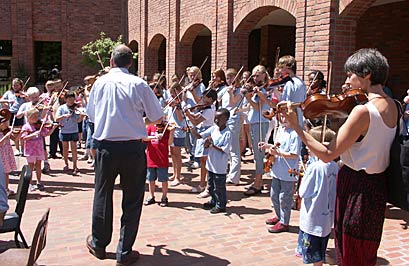

Campus Currents
Suzuki Institute Brings Masters and Music to WWC
Shinichi Suzuki taught stringed instruments in a revolutionary way, encouraging children to play through imitation, in contrast to simply reading sheet music. Beginning in Japan in the early 1900s, Suzuki’s philosophy and teaching techniques spawned the worldwide Suzuki Method phenomenon.
Benjamin Gish, a 1979 music graduate and cello instructor at Walla Walla College, is a firm believer in the Suzuki Method. His experience as a Suzuki instructor, both locally and across the country, helped bring a musical experience to the WWC campus. Last summer, he organized the Walla Walla Suzuki Institute, a weeklong music camp based on Suzuki’s techniques.

During the school year, Gish serves as the orchestra director at Walla Walla Valley Academy. In the summers he participates in Suzuki institutes, including the former Suzuki Institute of the Palouse, held at Washington State University.
When the current director retired, Gish took on the project, spending several hours each week throughout the year pulling details together. Much of his time was spent putting together a cast of “dream teachers.” “That was a big challenge,” Gish says. “But I knew the faculty would be the big draw.” He ended up with a dozen teachers from around the world, including some of the biggest names in the Suzuki world: William and Doris Preucil, founders of a large Suzuki school and former leaders of the Suzuki Association of the Americas; Moshe Neumann from Israel; and former long-time WWC music professor Glenn Spring and his wife, Kathleen, who also taught music.
Gish also strived to offer students a unique experience by incorporating the organ located in the Walla Walla College Church. Kraig Scott, professor of organ, harpsichord, and music history at WWC , taught a class introducing students to the organ. He also agreed to play Suzuki chimes on the organ at noon, which rang out over campus each day.
“Having the Institute here draws more attention to music in the area,” says Gish. “As a teacher, it’s excellent motivation. Students have summer teachers who are anxious to hear what progress they’ve made over the year. It’s the beginning of something that may last a very long time here.” W
Previous Story | Next Story | Back to Contents